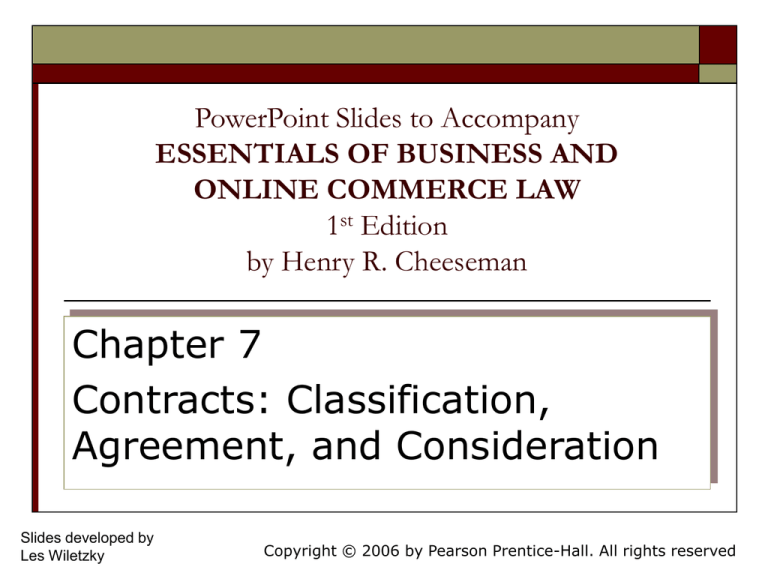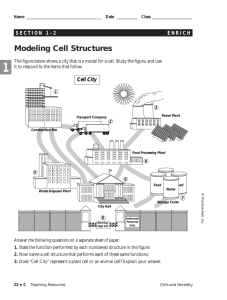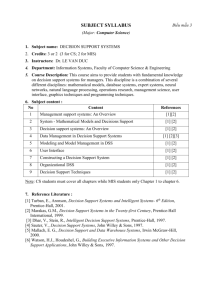
PowerPoint Slides to Accompany
ESSENTIALS OF BUSINESS AND
ONLINE COMMERCE LAW
1st Edition
by Henry R. Cheeseman
Chapter 7
Contracts: Classification,
Agreement, and Consideration
Slides developed by
Les Wiletzky
Copyright © 2006 by Pearson Prentice-Hall. All rights reserved
Introduction
Contracts are the basis of many of our daily
activities
They provide the means for individuals and
businesses to sell and otherwise transfer
property, services, and other rights
Without enforceable contracts, commerce
would collapse
Copyright © 2006 by Pearson Prentice-Hall. All rights reserved.
07 - 2
Definition of a Contract
A contract is an agreement that is enforceable
by a court of law or equity
If one party fails to perform as promised, the
other party can use the court system to
enforce the contract and recover damages or
other remedy
Copyright © 2006 by Pearson Prentice-Hall. All rights reserved.
07 - 3
Parties to a Contract
Offeror – The party who makes an offer to enter into a
contract
Offeree – The party to whom an offer to enter into a contract
is made
Offer
Offeror
Offeror makes an
offer to the offeree
Offeree
Acceptance
Copyright © 2006 by Pearson Prentice-Hall. All rights reserved.
Offeree has the power
to accept the offer and
create a contract
07 - 4
Elements of a Contract
1. Agreement
2. Consideration
3. Contractual
Capacity
4. Lawful Object
Copyright © 2006 by Pearson Prentice-Hall. All rights reserved.
07 - 5
Sources of Contract Law
1. The Common Law of Contracts
2. The Uniform Commercial Code
3. The Restatement of the Law of Contracts
4. Uniform Computer Information Transactions
Act (UCITA)
Copyright © 2006 by Pearson Prentice-Hall. All rights reserved.
07 - 6
Classifications of Contracts:
Formation (1 of 2)
1. Bilateral contract – a promise for a promise
2. Unilateral contract – A promise for an act
3. Express contract – A contract expressed in
oral or written words
4. Implied-in-fact contract – A contract inferred
from the conduct of the parties
Copyright © 2006 by Pearson Prentice-Hall. All rights reserved.
07 - 7
Classifications of Contracts:
Formation (2 of 2)
5. Quasi-contract – A contract implied by law to
prevent unjust enrichment
6. Formal contract – A contract that requires a
special form or method of creation
7. Informal contract – A contract that requires
no special form or mode of creation
Copyright © 2006 by Pearson Prentice-Hall. All rights reserved.
07 - 8
Classifications of Contracts:
Enforceability
1. Valid contract – A contract that meets all of
the essential elements to establish a contract
2. Void contract – No contract exists
3. Voidable contract – A party has the option of
voiding or enforcing the contract
4. Unenforceable contract – A contract that
cannot be enforced because of a legal
defense
Copyright © 2006 by Pearson Prentice-Hall. All rights reserved.
07 - 9
Classifications of Contracts:
Performance
1. Executed contract – A contract that is fully
performed on both sides
2. Executory contract – A contract that is not
fully performed by one or both parties
Copyright © 2006 by Pearson Prentice-Hall. All rights reserved.
07 - 10
Agreement
Agreement – the manifestation by two or
more persons of the substance of a contract
It requires an offer and an acceptance
Copyright © 2006 by Pearson Prentice-Hall. All rights reserved.
07 - 11
Offer
The manifestation of willingness to enter into
a bargain, so as to justify another person in
understanding that his assent to that bargain
is invited and will conclude it [Section 24 of
the Restatement (Second) of Contracts]
Copyright © 2006 by Pearson Prentice-Hall. All rights reserved.
07 - 12
Termination of an Offer
1.
2.
3.
4.
5.
Revocation of the offer by the offeror
Rejection of the offer by the offeree
Counteroffer by the offeree
Destruction of the subject matter
Death or incompetence of the offeror or
offeree
6. Supervening illegality
7. Lapse of time
Copyright © 2006 by Pearson Prentice-Hall. All rights reserved.
07 - 13
Option Contracts
An offeree can prevent the offeror from
revoking his or her offer by paying the offeror
compensation to keep the offer open for an
agreed-upon period of time
This payment is called an option contract
The offeror agrees not to sell the property to
anyone but the offeree during the option
period
Copyright © 2006 by Pearson Prentice-Hall. All rights reserved.
07 - 14
Acceptance
A manifestation of assent by the offeree to the
terms of the offer in a manner invited or
required by the offer as measured by the
objective theory of contracts [Section 50 of
the Restatement (Second) of Contracts]
The oferee’s acceptance must be unequivocal
The mirror image rule
Copyright © 2006 by Pearson Prentice-Hall. All rights reserved.
07 - 15
Time and Mode of Acceptance (1 of 2)
Mailbox Rule (Acceptance-Upon-Dispatch
Rule)
An acceptance is effective when it is dispatched
Proper Dispatch
An acceptance must be properly addressed,
packaged, and posted to fall within the mailbox
rule
Copyright © 2006 by Pearson Prentice-Hall. All rights reserved.
07 - 16
Time and Mode of Acceptance (2 of 2)
Express Authorization
A stipulation in the offer that says the acceptance must be
by a specified means of communication
e.g., registered mail, telegram
Copyright © 2006 by Pearson Prentice-Hall. All rights reserved.
07 - 17
Offer and Acceptance - Summary
Communication by Offeror
Effective When
Offer
Received by offeree
Revocation of offer
Received by offeree
Communication by Offeree
Effective When
Rejection of offer
Received by offeror
Counteroffer
Received by offeror
Acceptance of offer
Sent by offeree
Copyright © 2006 by Pearson Prentice-Hall. All rights reserved.
07 - 18
Consideration
Consideration – something of legal value
given in exchange for a promise
Consideration must be given before a
contract can exist
Most common types of consideration:
Tangible payment (e.g., money or property)
Performance of an act (e.g., providing legal services)
Copyright © 2006 by Pearson Prentice-Hall. All rights reserved.
07 - 19
Gift Promise
Gift promises (gratuitous promises) are
unenforceable because they lack
consideration
A “completed gift promise” becomes a true
gift, which by definition is irrevocable
Copyright © 2006 by Pearson Prentice-Hall. All rights reserved.
07 - 20
Contracts Lacking Consideration (1 of 2)
Illegal Consideration
A contract cannot be supported by a promise to refrain
from doing an illegal act because that is illegal
consideration
Contracts based on illegal consideration are void
Moral Obligations
Promises made out of a sense of moral obligation or honor
are generally not enforceable on the ground that they lack
consideration
Copyright © 2006 by Pearson Prentice-Hall. All rights reserved.
07 - 21
Contracts Lacking Consideration (2 of 2)
Preexisting Duty
A promise lacks consideration if a person promises to
perform an act or do something he or she is already under
an obligation to do
The promise is unenforceable because no new
consideration has been given
Past Consideration
Past consideration (e.g., prior acts) will not support a new
contract
New consideration must be given
Copyright © 2006 by Pearson Prentice-Hall. All rights reserved.
07 - 22
The United Nations Convention on Contracts
for the International Sale of Goods (CISG)
Applies to contracts for the international sale
of goods
i.e., the buyer and seller must have their places of
business in different countries
Additionally, either
both of the nations must be parties to the convention, or
the contract specifies that the CISG controls
Copyright © 2006 by Pearson Prentice-Hall. All rights reserved.
07 - 23







